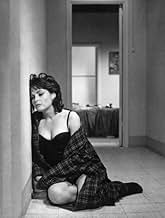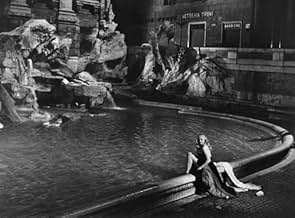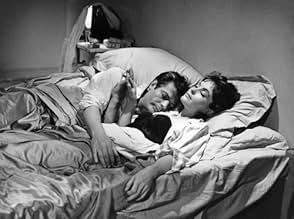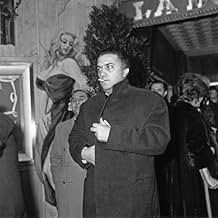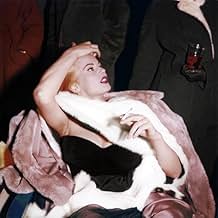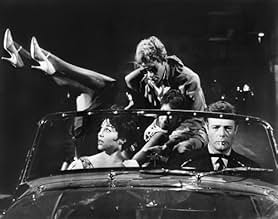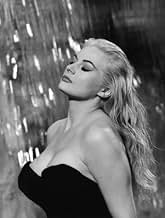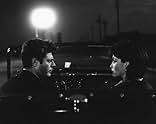Uma série de histórias que se seguem por uma semana, a vida de um jornalista que mora em Roma.Uma série de histórias que se seguem por uma semana, a vida de um jornalista que mora em Roma.Uma série de histórias que se seguem por uma semana, a vida de um jornalista que mora em Roma.
- Direção
- Roteiristas
- Artistas
- Ganhou 1 Oscar
- 11 vitórias e 12 indicações no total
Anouk Aimée
- Maddalena
- (as Anouk Aimee)
Magali Noël
- Fanny
- (as Magali Noel)
Resumo
Reviewers say 'La Dolce Vita' delves into themes of fame, decadence, and the superficiality of celebrity culture, using these characters to underscore the contrasts and contradictions within high society. The portrayal of it's characters enhances the film's satirical and critical perspective on the lifestyles and attitudes of the era, offering a nuanced commentary on the nature of fame and its impact on individuals and society.
Avaliações em destaque
This is one of those films where I just don't want it to end as I enjoyed it so much. So many memorable and humorous scenes - Fellini successfully captured the atmosphere of picturesque Rome lifestyle. All of the characters are interesting, complex and I especially loved Anita Ekberg's performance! Amazing!
(first of all, sorry my poor english) Who, in this entire world, drunk as a horse in the middle of the night, never discovered the meaning of life, that it can be so easy and joyfull that hurts. This happens with a certain frequency. The big problem is, after all that, to face all the thoughts and conclusions in a sober monday morning, when everything is just real, concious and above all that sincere. This is the the big question and problem of Marcello Rubini, a reporter of a gossip magazines who has to deal with the fact that he tastes the same poison he spreads by leaving in a group of people which he sucks his living.
In a moment he is directing his papparazzi and, in the next, he is running away from them. He flows between all kinds of social circles and the only impression he gives is that it doesnt matter what kind of craziness you are getting into everything is a big cliché. From the mainstream world of a gorgeous actress who feels able to express opinions about everything (and we buy it), passing throught the religious world of the faith, and also an intellectual circle that gives a fake impression of freedom, everything turns out to be an escape. That blonde girl appears as a stroke of pureness and sincereness, something we should really look for, but we just dont. In the case of Marcello's life, writing is the solutions he always substitute for vain experiences. Something he likes and that he needs a young girl to tell him that. That litlle cute girl is a person Marcello would like to be, someone who faces the soberty of a monday morning with hopeness and happiness.
A masterpiece.
In a moment he is directing his papparazzi and, in the next, he is running away from them. He flows between all kinds of social circles and the only impression he gives is that it doesnt matter what kind of craziness you are getting into everything is a big cliché. From the mainstream world of a gorgeous actress who feels able to express opinions about everything (and we buy it), passing throught the religious world of the faith, and also an intellectual circle that gives a fake impression of freedom, everything turns out to be an escape. That blonde girl appears as a stroke of pureness and sincereness, something we should really look for, but we just dont. In the case of Marcello's life, writing is the solutions he always substitute for vain experiences. Something he likes and that he needs a young girl to tell him that. That litlle cute girl is a person Marcello would like to be, someone who faces the soberty of a monday morning with hopeness and happiness.
A masterpiece.
Mostly because of the terrific high contrast, B&W visuals, and the evocative music, this is the only Fellini film I have seen that I have somewhat enjoyed. I recommend it, but not without reservations. It's a complex film with many textured layers of meaning. And, in typical Fellini fashion, it rambles and it meanders.
Deviating from standard three-Act structure, Fellini's story consists of roughly eight episodes, all starting at night and ending at dawn, more or less. Each has its own crisis. And the only thing that unites these episodes into a coherent whole is the story's protagonist, Marcello (Marcello Mastroianni). In his job as a journalist and overall observer of human nature, Marcello encounters people in high society who seem outwardly happy and self-fulfilled. On closer examination, however, these people are empty, hollow, alienated, emotionally adrift and vacant.
A good example is the starlet Sylvia (Anita Ekberg), a glamorous figure, but she's all image and no substance. "La dolce vita" is the first film that uses the concept of "paparazzi", which implies the importance of "image", separate from substance.
Throughout the various episodes Marcello sees these "images" of happiness, of contentment, but the images are deceptive, elusive, unreliable. In one episode, two "miracle" children "see" the Madonna. "The Madonna is over there", shouts one child. The crowd chases after her. But the other child who "sees" the Madonna runs in the opposite direction. Happiness, self-fulfillment, religious visions ... they're all a will-o'-the-wisp. And so, the film conveys a sense of pessimism and cynicism.
The film thus has deep thematic value. It caused a scandal when it was released, and was banned by the Catholic Church, apparently for appearing to be anti-religious.
Yet for all its deep meaning, "La dolce vita" can be a trial to sit through. Somewhere in the second half I began to lose interest. I don't have a problem with Fellini's deviation from standard plot structure. I do have a problem with a director who doesn't know when to quit. This film goes on for almost three hours. A good edit, to delete all the fat, would have tightened up the story and rendered it more potent. As is, it's too strung out, too stretched, too meandering.
If the viewer can persevere, there's enormous cinematic art in this film. And helped along by Nino Rota's music, the film is wonderfully evocative, at times stylishly melancholy.
Deviating from standard three-Act structure, Fellini's story consists of roughly eight episodes, all starting at night and ending at dawn, more or less. Each has its own crisis. And the only thing that unites these episodes into a coherent whole is the story's protagonist, Marcello (Marcello Mastroianni). In his job as a journalist and overall observer of human nature, Marcello encounters people in high society who seem outwardly happy and self-fulfilled. On closer examination, however, these people are empty, hollow, alienated, emotionally adrift and vacant.
A good example is the starlet Sylvia (Anita Ekberg), a glamorous figure, but she's all image and no substance. "La dolce vita" is the first film that uses the concept of "paparazzi", which implies the importance of "image", separate from substance.
Throughout the various episodes Marcello sees these "images" of happiness, of contentment, but the images are deceptive, elusive, unreliable. In one episode, two "miracle" children "see" the Madonna. "The Madonna is over there", shouts one child. The crowd chases after her. But the other child who "sees" the Madonna runs in the opposite direction. Happiness, self-fulfillment, religious visions ... they're all a will-o'-the-wisp. And so, the film conveys a sense of pessimism and cynicism.
The film thus has deep thematic value. It caused a scandal when it was released, and was banned by the Catholic Church, apparently for appearing to be anti-religious.
Yet for all its deep meaning, "La dolce vita" can be a trial to sit through. Somewhere in the second half I began to lose interest. I don't have a problem with Fellini's deviation from standard plot structure. I do have a problem with a director who doesn't know when to quit. This film goes on for almost three hours. A good edit, to delete all the fat, would have tightened up the story and rendered it more potent. As is, it's too strung out, too stretched, too meandering.
If the viewer can persevere, there's enormous cinematic art in this film. And helped along by Nino Rota's music, the film is wonderfully evocative, at times stylishly melancholy.
Returning to this film after many years, I was mesmerized for its entire three hours and could have stuck with it for even longer. More than just a parade of degenerate Sixties Eurotrash, all of human life is captured in these frames, from prostitutes living in flooded slum apartments to glittering nobility in their crumbling castles.
The common thread is the thoroughly captivating Marcello Mastroianni as the gossip columnist/aspiring novelist, later turned burned-out publicist. His relationship with the parade of females who inhabit his world, often fleetingly, is nuanced and authentic feeling, while the episode with his father, who shows up for an unexpected visit, is a delight that brought a wide smile to my face.
The unique, episodic structure of the film feels neither showy nor forced, and the film moves through its segments with the natural grace of a great symphony.
An added bonus for me was seeing a young Nico of Velvet Underground fame , looking relaxed and happy. Would that things always turned out that way for her.
In sum, a totally unique tour de force and, unquestionably, one of the greatest achievements in cinematic history.
The common thread is the thoroughly captivating Marcello Mastroianni as the gossip columnist/aspiring novelist, later turned burned-out publicist. His relationship with the parade of females who inhabit his world, often fleetingly, is nuanced and authentic feeling, while the episode with his father, who shows up for an unexpected visit, is a delight that brought a wide smile to my face.
The unique, episodic structure of the film feels neither showy nor forced, and the film moves through its segments with the natural grace of a great symphony.
An added bonus for me was seeing a young Nico of Velvet Underground fame , looking relaxed and happy. Would that things always turned out that way for her.
In sum, a totally unique tour de force and, unquestionably, one of the greatest achievements in cinematic history.
There really isnt a plot. This is about a tabloid photographer and some scenarios he gets into. All the characters seem vain, selfish and wanting more from life without actually knowing what they want. The Rome nightlife is brought to life here and there are many scenes at lavish parties where all the characters dont appear to have any emotional connection to one another. There are also disconnected Catholic themes throughout the movie. It leaves you questioning your own life and emptiness.
Você sabia?
- CuriosidadesThe famous scene in the Trevi Fountain was shot over a week in March, when nights were still cold. According to Federico Fellini (in an interview with Costanzo Costantini), Anita Ekberg stood in the cold water in her dress for hours with no trouble. Marcello Mastroianni, on the other hand, had to wear a wetsuit beneath his clothes, and even that wasn't enough. Still freezing, he downed an entire bottle of vodka, so he was completely drunk while shooting the scene.
- Erros de gravaçãoWhen Marcello and Maddalena arrive at the prostitute's apartment, a long electric cable (light?) can be seen attached to the right rear of the car, moving along until the car stops.
- Versões alternativasIn the original American release, distributed by American International Pictures, the titles open with the AIP logo and appear over a shot of the sky with clouds. In the current release on DVD - and as shown on TCM - the title sequence is over a black background. When originally released, censors in several countries trimmed certain scenes, including the orgy near the end of the film.
- ConexõesEdited into La case du siècle: Cinecittà, de Mussolini à la Dolce Vita (2021)
Principais escolhas
Faça login para avaliar e ver a lista de recomendações personalizadas
Detalhes
- Data de lançamento
- Países de origem
- Central de atendimento oficial
- Idiomas
- Também conhecido como
- La dulce vida
- Locações de filme
- Villa Giustiniani-Odescalchi, Bassano Romano, Viterbo, Lazio, Itália(abandoned castle scenes)
- Empresas de produção
- Consulte mais créditos da empresa na IMDbPro
Bilheteria
- Faturamento bruto mundial
- US$ 217.420
- Tempo de duração2 horas 54 minutos
- Cor
- Proporção
- 2.35 : 1
Contribua para esta página
Sugerir uma alteração ou adicionar conteúdo ausente


![Assistir a Trailer [English SUB]](https://m.media-amazon.com/images/M/MV5BNjE3MTU3OTItN2I0NS00YzU2LWE1ZTctZDQ3Y2I1NDc4MGMxXkEyXkFqcGdeQXRyYW5zY29kZS13b3JrZmxvdw@@._V1_QL75_UX500_CR0)
![La Dolce Vita: [2-Disc Collectors Edition]](https://m.media-amazon.com/images/M/MV5BZTY2ZTg3YmEtZDZkMS00MmFkLThhMjItMWVmN2NlNmJhZGZjXkEyXkFqcGdeQXVyNzU1NzE3NTg@._V1_QL75_UX500_CR0)

